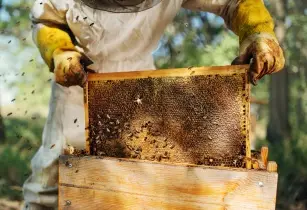Morocco’s ministry of Agriculture, Fisheries, Rural Development and Water and Forestry has announced a special programme developed to support beekeepers affected by the phenomenon of disappearance of bee colonies, noted recently in some regions
The government has allocated an amount of US$35.39mn to take immediate measures through the support of beekeepers for the reconstruction of infected hives. They will distribute new colonies of bees and establish a national campaign to treat hives against varroasis disease as well as awareness campaigns for the benefit of beekeepers, especially with regard to good practices in beekeeping, said the ministry in a statement.
A working session was held via videoconference, by the head of government and the minister of Agriculture, Fisheries, Rural Development and Water and Forests, accompanied by the director general of the National Office of Food Safety (ONSSA) and the central director of production channels to examine the causes of this phenomenon and ways to mitigate its effects on the beekeeping sector.
During this meeting, the director general made a presentation on the urgent measures taken as well as the preliminary results of research and analysis carried out by its regional veterinary services, in collaboration with representatives of the Moroccan Interprofessional Federation of Beekeeping. Also, laboratory investigations exclude the hypothesis that a bee disease is the cause of this phenomenon, read the statement.
The ONSSA has formed a committee of multidisciplinary experts to continue research and studies on this phenomenon, the statement said, noting that the Office also deepens the field surveys in collaboration with professionals in the sector to identify factors contributing to the development of this phenomenon.
The phenomenon known as ‘Bee Colony Collapse Disorder’ has also been observed in countries in Europe, America and Africa.
The research attributes this to several factors, among others, the low rainfall, the decrease in the quantity and quality of food available for bees or the health status of the apiaries and the prevention methods followed, the statement concluded.





